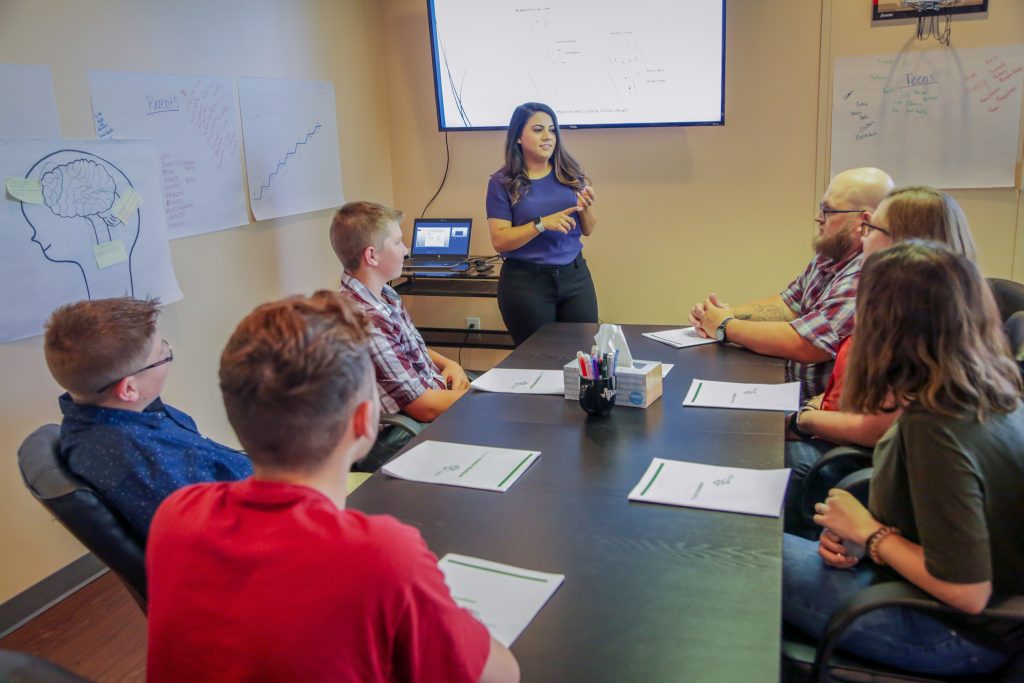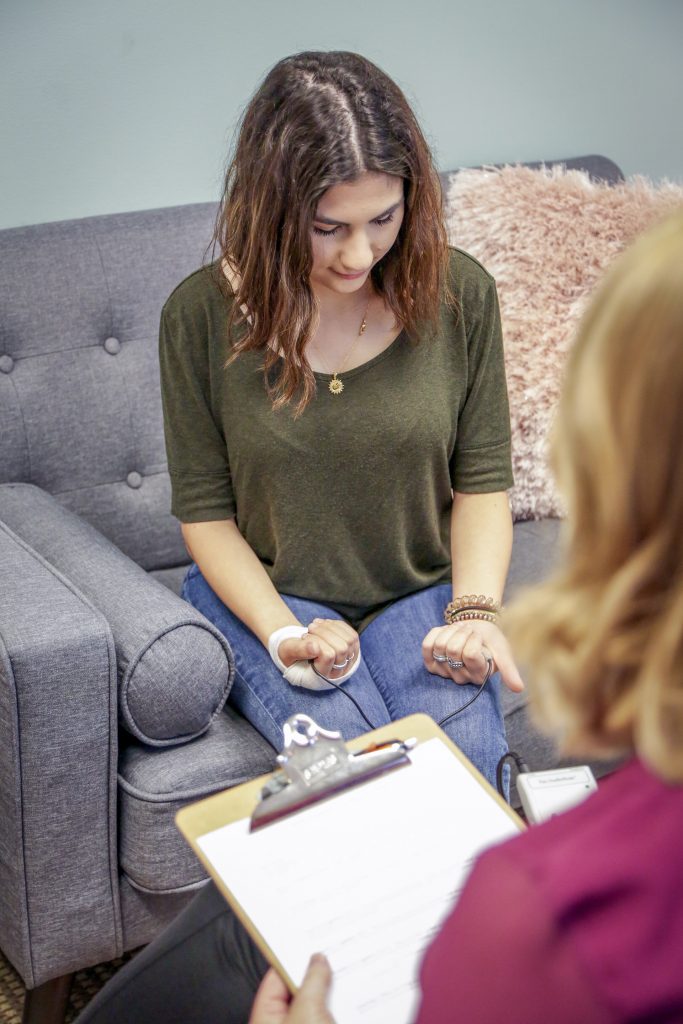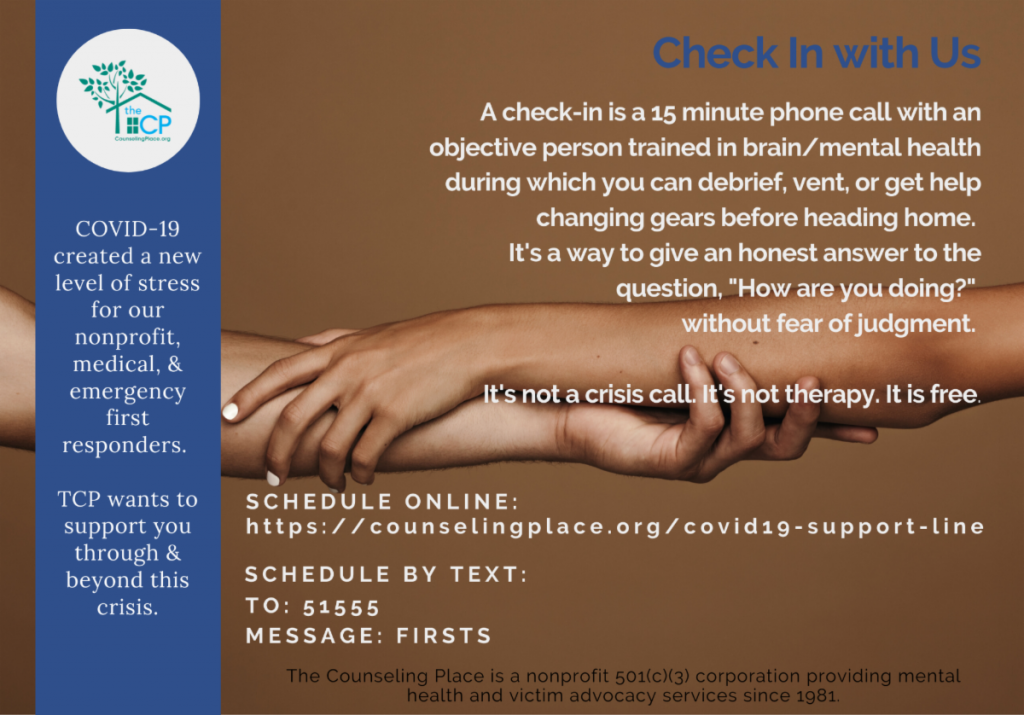By Elizabeth Lenart | Contributor
The Counseling Place, which provides affordable professional counseling and education services on a sliding scale to all ages and income levels in North Texas, is asking for the community’s support during “North Texas Giving Tuesday Now” through May 5 at midnight. With the onset of COVID-19, anxiety, depression, and emotional exhaustion caused by the virus, uncertain employment, and isolation are making existing mental health problems more complex and creating new ones, drastically elevating the need for mental health services now and in the future.
“The virus has changed life as we know it, and based on what our clinicians are already seeing, we are bracing ourselves for what is to come,” said Deborah Dobbs, who has been with The Counseling Place for 23 years, serving as executive director for the past ten years.
From February to March, The Counseling Place’s referrals of suicides and assaults tripled, and domestic violence increased 30 percent.
“Our current situation, our confinement and lack of mobility with no clear end in sight challenge nearly everyone’s coping skills,” added Dobbs. “People who were recovering from trauma may have their progress thwarted by these circumstances. Think of Maslow’s Hierarchy of Needs. People are focused on meeting their basic needs. Healing strategies, like grounding and mindfulness, take a back seat to having enough food and keeping a roof over one’s head. Consequently, they’re experiencing huge setbacks in their progress.”
“Many people in general are turning to alcohol and drugs, which can cause them to lose tempers more easily and become destructive toward relationships,” added Dobbs. “Relationships that have been volatile can quickly turn violent. Domestic violence victims are one of our greatest worries. During COVID-19 we have been providing services by phone or video. That’s not an option for many victims of domestic violence. We fear for their safety, and we’re bracing ourselves for the aftermath of this COVID Culture. We need to prepare for a surge in services.”
Dobbs feels strongly that the psycho-social impact of COVID-19 is pervasive, powerful and should not be underestimated. “Our mental health determines how we respond and adjust,” she added.
Since COVID-19, there are more conflicts between divorced parents regarding custody arrangements with children. Many teens who are missing graduation, prom and normal social interactions are experiencing anxiety and lack the skills to cope. Some resort to self-harm, such as cutting.
Of special concern is the mental health of the many healthcare providers and first responders on the front lines working in unimaginable environments with worry of exposing their family members and even dying from the virus.
Helping the helpers is an important area of focus at The Counseling Place, which provides specialized counseling services for first responders. This effort increased after the 2019 Dallas area tornadoes, and The Counseling Place launched self-care groups for front-line responders in nonprofit agencies.
“After the tornadoes, Cindy Shafer, a forward-thinking leader and executive director of The Network of Community Ministries, reached out to us for help for their staff serving on the front lines, and we later received a grant from the Communities Foundation to support and expand these services to other nonprofit agencies,” added Dobbs.
In response to COVID-19, The Counseling Place launched a “check-in” service to support nonprofit workers on the front lines as well as law enforcement officers, 911 operators, and medical professionals. Through this service initiated with a text, individuals can sign up for a time to check in with someone on the phone who can ask how they are doing and give them a chance to switch gears before heading home. The service is free and confidential.
“It’s critical to help the helpers, and additional funding enables us to expand this service. We must continue to come up with innovative ways such as this to help those affected by this pandemic,” stated Dobbs.
In 2019 The Counseling Place provided individual and family counseling to 555 new clients; served 226 children and teens from all over the DFW area through its psychoeducation groups; and provided victims’ assistance services to over 1,600 people throughout the metroplex. The demand exceeds the agency’s capacity to serve.
“It’s no secret that America has a critical shortage of affordable mental health services, and this predates the pandemic,” added Dobbs. “It’s absolutely devastating when we have to turn people away who have mustered the courage to seek assistance, fighting a widespread mental health stigma.”
According to a 2020 Pre-COVID-19 Mental Health America (MHA) annual State of Mental Health Report, which ranked all 50 states and the District of Columbia based on several mental health and access measures, over 45 million Americans – almost 20% – are experiencing a mental illness; over 10.3 million adults have serious thoughts of suicide in the United States – an increase of nearly 450,000 people from last year’s data set; and 57 percent of adults with a mental illness receive no treatment.
A recent study by Qualtrics identifies the severity of the global mental health crisis since COVID-19. Results show that 67% of people are reporting higher levels of stress since the outbreak of COVID-19; 57% say they have greater anxiety since the outbreak; 54% say they are more emotionally exhausted; 53% say they feel sadness day-to-day; 50% feel they are more irritable; and 42% report their overall mental health has declined.
“We have a long road ahead as we anticipate an overwhelming number of trauma and grief clients,” added Dobbs. “Many cases of the blues will turn into depression, more people will need to grieve after suicide, and even natural expected deaths are taking a greater toll because we are denied the ability to mourn within our traditions. Through ‘North Texas Giving Day Tuesday Now,’ we hope to shed light on this devastating hidden crisis that is going to have long-term effects far past the pandemic.”
The Counseling Place is asking for your support at https://www.northtexasgivingday.org/the-counseling-place through May 5 at midnight.
To learn more visit https://counselingplace.org/
The Counseling Place (The CP), established in 1979 as the first nonprofit mental health agency in Richardson, Texas, is dedicated to building, repairing, and strengthening emotional health for people of all ages and income levels in the Dallas area. The CP provides professional and affordable (or free) counseling services to individuals, families, and couples in need of outpatient mental health services; psychoeducational community courses; and a victims’ assistance program through formal contracts with the Richardson and Sachse Police Departments as well as for crime victims referred by any jurisdiction. The CP also collaborates with other nonprofits to provide mental health services to their clients, including Heart of Autism, to help affected families. Call 469-283-0340 or visit https://counselingplace.org/
 Youth Programs Director Lorjon Ali, leads a Project Positive Group for teens and parents. Project Positive is The Counseling Place’s social emotional learning group course that helps teens strengthen their emotional intelligence, cultivate healthy coping skills and identify and invest in healthy relationships. COVID-19 has had a profound effect on teens, so Lorjon teaches the course by video now, one-on-one with teens, regardless of a parent’s ability to pay.
Youth Programs Director Lorjon Ali, leads a Project Positive Group for teens and parents. Project Positive is The Counseling Place’s social emotional learning group course that helps teens strengthen their emotional intelligence, cultivate healthy coping skills and identify and invest in healthy relationships. COVID-19 has had a profound effect on teens, so Lorjon teaches the course by video now, one-on-one with teens, regardless of a parent’s ability to pay.
 Eye Movement Desensitization and Reprocessing Therapy (EMDR) is a modality of therapy that tends to expedite healing from trauma with less suffering. It involves bilateral stimulation of the brain. She said that it’s fascinating and amazing. All of their clinicians are trained to do this, which she added is almost unheard of for a nonprofit org. There’s more at Emdr.com
Eye Movement Desensitization and Reprocessing Therapy (EMDR) is a modality of therapy that tends to expedite healing from trauma with less suffering. It involves bilateral stimulation of the brain. She said that it’s fascinating and amazing. All of their clinicians are trained to do this, which she added is almost unheard of for a nonprofit org. There’s more at Emdr.com
 Therapy dog in training, Watson
Therapy dog in training, Watson

Source: Advice & Features - goodlifefamilymag.com



